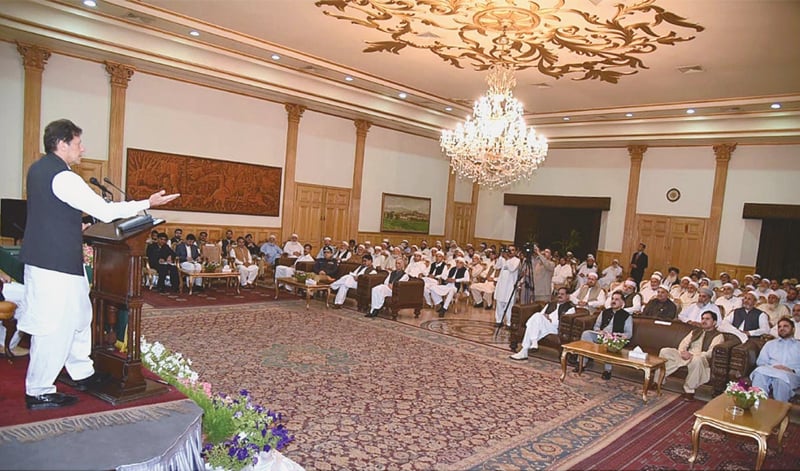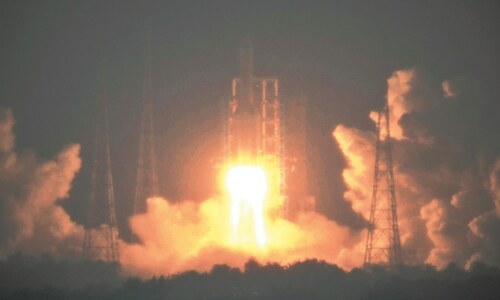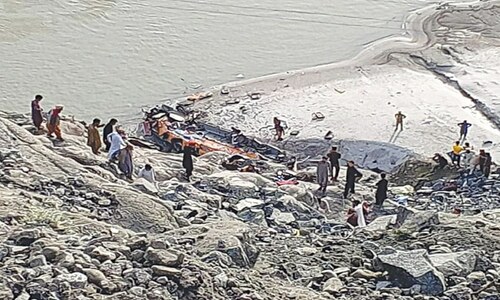
PESHAWAR: Prime Minister Imran Khan has said the new laws and the governance system to be enforced in the merged districts of the erstwhile Federally Administered Tribal Areas (Fata) with Khyber Pakhtunkhwa will be made compatible with tribal traditions to ensure that the merger does not affect the tribal way of life.
Addressing a 40-member jirga delegation of Khyber district at Governor House, Prime Minister Khan said the government was trying to ensure that both the old and new systems run smoothly without causing any difficulty to the people of the region.
He paid gratitude to the tribal people for maintaining peace in their areas during the transition period when no laws were enforced there for almost a year since the announcement of the merger. This showed that the tribal system was based on peace, as the tribal areas had minimal crime rate even before 9/11 and people were getting easy justice through an indigenous governance system, he added.
The prime minister, who arrived here on a brief visit, said the government had learnt a lesson from the experience of Dir and Swat when the crime rate had swollen dramatically after the merger of the two areas. This had happened because the people of those areas had no understanding of the laws enforced in the settled areas, he recalled.
KP chief minister asked to hold talks with protesting doctors without compromising on reforms agenda
To ensure minimum impact on the traditions of tribal people after the merger of erstwhile Fata areas with Khyber Pakhtunkhwa, alternative resolution system would be introduced at police stations in all the merged districts for quick dispensation of justice, Mr Khan said, adding that the system had already been experimented in Khyber Pakhtunkhwa during the past five years.
PM Khan said no one had raised voice for them when they had been facing terrorism, displacement during the military operation and drone attacks. However, he assured them that this would not happen again after complete merger of the tribal areas with Khyber Pakhtunkhwa. The recent legislation gave the people of tribal areas increased representation in the assemblies, he said, while terming it a huge success.
Even the new local government system to be introduced in the merged districts was very similar to the old governance system of the tribal areas, he said. Under the system, he added, village councils would be formed and villages would get direct funding from the provincial government. They would be empowered to make their own decisions regarding development, he said, adding that a similar system would also be introduced in Punjab.
The Prime Minister said though the merger of tribal areas was not an easy task, the government would ensure resolution of their issues with consultation of tribal elders through an exclusive committee.
Khyber Pakhtunkhwa Governor Shah Farman, Chief Minister Mahmood Khan and leaders of Pakistan Tehreek-i-Insaf (PTI) were also present.
Doctors’ strike
About the ongoing doctors’ strike across Khyber Pakhtunkhwa, Prime Minister Khan observed that this was aimed at pressurising the government to abandon its reforms agenda but the government would not abandon its programme to improve public sector hospitals.
While addressing at Shaukat Khanum Memorial Cancer Hospital (SKMCH) Iftar-dinner, Mr Khan said he had asked KP Chief Minister Mahmood Khan to talk to the protesting doctors. However, at the same time, he made it clear that the government would not back off from its reforms agenda at any cost.
“No matter how much pressure you are going to put on the government we will not back off,” he said.
The prime minister accused the doctors of being supported by political parties and said that they were not ready to be blackmailed and pressurised.
The protests, which erupted on Tuesday after a scuffle between the provincial health minister and a senior doctor at Khyber Teaching Hospital, have paralysed the health delivery system across the province.
“A few doctors are running a campaign against the reforms agenda,” Mr Khan said, adding that the PTI government wanted to bring government health facilities on par with the SKMCH.
He asked the protesting doctors whether they were satisfied with the treatment being offered at government hospitals.
He said the PTI government was trying to introduce SKMCH-like system in public sector hospitals. “There is a campaign going against this goal,” Mr Khan said, adding that his government was not privatising health care sector but “only changing the management”.
The PM said the Shaukat Khanum hospital, which was currently providing chemotherapy and radiation facilities, was the largest cancer hospital between Lahore and Afghanistan. Also, the hospital would resume cancer surgery soon, he said, in addition to other modern facilities.
He asked those attending the dinner to donate for the hospital while regretting that he would not be able to personally receive cheques from donors.
Published in Dawn, May 19th, 2019














































Dear visitor, the comments section is undergoing an overhaul and will return soon.